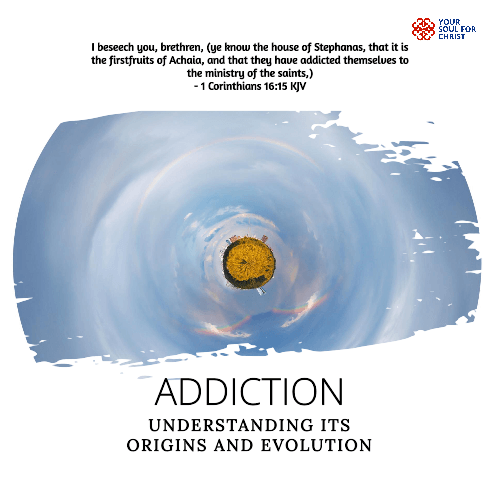I beseech you, brethren, (ye know the house of Stephanas, that it is the firstfruits of Achaia, and that they have addicted themselves to the ministry of the saints,)
1 Corinthians 16:15 KJV
The term addiction originates from the Latin word addictus, meaning “assigned” or “bound to.” The verb addicere, meaning “to devote,” “to surrender,” or “to assign,” gave rise to the term. Ancient Roman law used the term addictus for a person legally bound to a creditor or master, often in servitude to repay debts. This sense of involuntary bondage or enslavement reveals addiction’s early connotations of confinement and lack of freedom.
Evolution of Addiction’s Meaning
- 16th Century: Addiction in English referred to a person’s devotion or commitment to an activity, cause, or person. It carried a largely neutral or positive meaning, reflecting dedication or attachment rather than any harmful behaviour.
- 17th and 18th Centuries: Over time, it began to shift in meaning. Particularly associated with excessive indulgence in behaviours or substances like alcohol, marking the start of its negative connotations.
- 19th Century: The word addiction became more closely linked to compulsive behaviours, especially substance abuse. Meanwhile, as awareness of drug dependency—such as with opium and morphine—grew, addiction took on the meaning of an unhealthy compulsion.
- Modern Usage: By the 20th century, it became widely recognised as a condition involving chronic, often harmful, compulsions. It now primarily refers to dependency on substances (like alcohol or narcotics). Likewise, with behaviours (such as gambling or internet use) that have physical, psychological, or social consequences.
In summary, in Ancient Rome, addiction was associated with legal servitude, reflecting a person’s obligation to a creditor or master. During the Medieval period, the term evolved to describe personal devotion or commitment, shifting away from a strictly legal context. However, addiction now refers to harmful compulsive behaviour and dependency, particularly in relation to substance use or other self-destructive habits. This progression highlights how the concept of addiction has transformed across eras, from a sense of external obligation to one of internal compulsion.
Defining Addiction Today
According to Merriam-Webster, addiction is “a compulsive, chronic, physiological, or psychological need for a habit-forming substance, behaviour, or activity that has harmful physical, psychological, or social effects and typically causes symptoms like anxiety, irritability, tremors, or nausea upon withdrawal or abstinence.” It can also be defined as the persistent, strong urge to engage in an activity or use a substance repeatedly.
The later definition suggests that it is not inherently harmful; it is the object of the addiction that determines its impact. For instance, addiction to harmful substances like drugs is destructive, whereas a committed passion for positive pursuits can have beneficial effects.
Addiction in a Biblical Context
In 1 Corinthians 16:15 (KJV), the Bible mentions: “I beseech you, brethren, (ye know the house of Stephanas, that it is the first fruits of Achaia, and that they have addicted themselves to the ministry of the saints).” In other Bible translations, the word addicted is expressed as:
- Devotion (NIV)
- Given oneself to something (ERV)
- Putting oneself out (MSG)
- Consecration and devotion (AMPC)
- Worked hard (EASY)
- Spending one’s life on something (NLT)
- Doing all you can (CEV)
- Dedication (CEB)
In conclusion, understanding the historical evolution of addiction—from ancient servitude to modern-day compulsions—gives us a broader perspective on its complex nature. Addiction itself isn’t inherently negative; rather, the focus of one’s addiction determines its impact. As believers, directing our devotion toward meaningful and positive pursuits can transform the concept of addiction into a powerful force for good.
